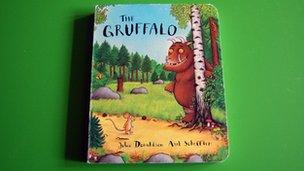Pupils learn to read 'in many ways', says laureate
- Published

Julia Donaldson wrote the popular children's story The Gruffalo
Children's laureate, Julia Donaldson, has raised concerns over the government's preferred method of teaching children to read in England.
She says pupils learn in "various different ways" and a phonics-based reading test could leave some feeling they are "not quite up to scratch".
Ministers promote phonics for reading, a system that focuses on sounds rather than recognising whole words.
The Department for Education said the ability to decode words was essential.
Speaking at the launch of a series of short plays aimed at raising young children's reading skills, Mrs Donaldson, author of the popular children's story The Gruffalo, said: "What I've always thought is that children learn in various different ways.
"Some children respond better to phonics, some to looking and seeing words and some learn by osmosis. Any good teacher knows you need a variety of ways of reading."
Mrs Donaldson said she was a supporter of phonics and there had been a time when she had wondered why the teaching method had not been used more but that now the pendulum had "swung too far the other way".

Mrs Donaldson says, while she supports phonics, it is not the only way children learn to read
"I can't see why it can't settle around the middle," she said.
Mrs Donaldson also questioned the government's reading test for six-year-olds.
The compulsory phonics check assesses a child's ability to sound out or decode a series of words, some of which are made up, to test their reading skills.
But some literacy experts and teaching unions say the test can mean good readers, who struggle with made-up words, can be labelled as failures.
"It is important to learn the different sounds, and teachers do their own checks. I think it is a bit patronising for teachers," Mrs Donaldson said.
The check "is going to mean a lot of schools teaching to the test" and could leave some youngsters feeling they had failed, she added.
"The government underestimates how easily children can feel that they're not quite up to scratch."
A Department for Education spokesman said: "Ensuring all children master the ability to decode and sound out new words is essential if they are to become confident readers.
"The phonics check will ensure that no child slips through the net still struggling with this basic skill."
Playlets
Mrs Donaldson said she came up for the idea for writing a series of playlets after listening to children at her son's school read.
She said giving each child a part had encouraged them to "read with much more expression".
The Bug Club Plays to Read include traditional stories such as The Hare And The Tortoise as well as dramas about children today.
"When helping to oversee a reading group with my eldest child, I realised that sometimes when reading books children would read in a wooden way, and get bored easily when it wasn't their turn," Mrs Donaldson said.
"I hit on the idea of writing some very short and simple plays where they could all get involved. It worked a treat. The children loved having a part to read and they started putting much more expression into the words.
"After one read-through we would swap the parts around and that way any new vocabulary really sank in. Their reading came on in leaps and bounds."
- Published15 October 2012
- Published27 September 2012